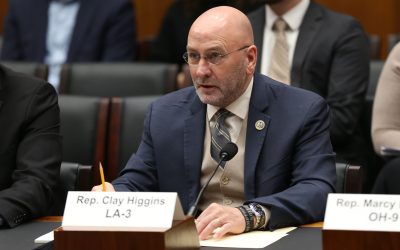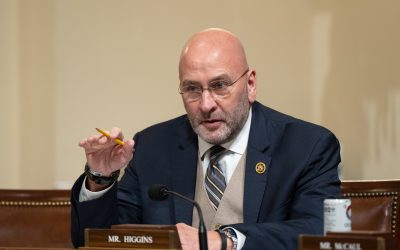Sportsmen’s groups and boating/fishing associations across the country celebrated last week’s U.S. House passage of H.R. 200, a bill entitled “Modernizing Recreational Fisheries Management Act of 2017” or by the more popular “Modern Fish Act.”
The bill, championed by a handful of congressmen from the five Gulf states, including lead author Rep. Garret Graves, R-La., is designed to give recreational fishermen greater recognition and established priorities in the reauthorization process of the Magnuson-Stevens Fishery Conservation and Management Act, the U.S.’s major marine fisheries law.
In a statement released after Thursday’s vote, Graves briefly outlined what he called “bipartisan support” for the bill in the House, and from a broad-based group of fishermen’s groups and even some commercial fishing interests.
Graves and fellow Louisiana’s Clay Higgins, and others, including Representatives Don Young, R-Alaska, the House Natural Resources chairman; Brian Babin and Gene Green, Rs-Texas and Marc Veazey, D-Texas; Robert Wittman, R-Virginia; Lee Zeldin, R-New York; Glenn Grothman, R-Wisconsin; Steve King, R-Iowa; Jeff Duncan, R-South Carolina; and, Austin Scott, R-Georgia stood for the bill’s introduction last year and this year’s debate an final passage.
It was Rep. Bradley Byrne, R-Alabama waded into the discussion: “Let me tell you, there are over 170 groups that have signed on to being supportive of this bill. … This is a very broadly, deeply supported bill among people who are actually fishing. Now, it may not be supported by people who don’t fish and who don’t know anything about fishing, but for those of us who do fish…we like it.”
For Baton Rouge’s Jeff Angers, , president of the Center for Sportfishing Policy, the issue carried across party lines.
“Marine recreational fishing is not a partisan issue, which was illustrated by the support H.R. 200 received from both parties today in the House,” Angers said before acknowledging the bill accomplishes the mission “to properly recognize recreational fishing within the Magnuson-Stevens Act. These bipartisan leaders have made the difference for anglers from coast to coast.”
The bill is the outcome of a 2014 effort from the recreational fishing and boating sectors, which formed the Morris-Deal Commission (Bass Pro Shops Johnny Morris and Maverick Boats’ Scott Deal) to produce a report entitled “A Vision for Managing America’s Saltwater Recreational Fisheries.”
MFA’s proponents acknowledged H.R. 200 addresses most of the concerns in the recreational sector and helps solve the uphill battle the recreational sector has had in dealing with years of outdated and outmoded data-collection issues and fishing regulations.
In post-vote releases, supporting groups indicated H.R. 200 tackled issues which heretofore ignored using more modern science and technology to guide fisheries management, decision-making, fishing access and preserving a conservation coda.
“The Modern Fish Act represents the collective priorities of the recreational fishing community for improving federal marine fisheries management. There are 11 million saltwater anglers in the U.S. who have a $63 billion economic impact annually and generate 440,000 jobs,” newly elected American Sportfishing Association president Glenn Hughes said. “This legislation will help ensure that the economic, conservation and social values of saltwater recreational fishing will continue well into the future.”
Other major sportsmen’s/trade groups pushing for the bill’s passage were the Theodore Roosevelt Conservation Partnership, the Coastal Conservation Association, the National Marine Manufacturers Association, Congressional Sportsmen’s Foundation, Recreational Fishing Alliance, National Coalition for Fishing Communities, American Scallop Association, Garden State Seafood Association, West Coast Seafood Processors Association, North Carolina Fisheries Association, Florida Keys Commercial Fishing Association, Gulf Coast Seafood Alliance and Southeastern Fisheries Association.



